Mycorrhizae - Study guides, Class notes & Summaries
Looking for the best study guides, study notes and summaries about Mycorrhizae? On this page you'll find 223 study documents about Mycorrhizae.
Page 4 out of 223 results
Sort by
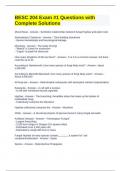
-
BESC 204 Exam #1 Questions with Complete Solutions
- Exam (elaborations) • 8 pages • 2024
- Available in package deal
-
- $12.49
- + learn more
Mycorrhizae - Answer-- Symbiotic relationships between fungal hyphae and plant roots Stachybotrys Chartarum - Answer-- "Sick Building Syndrome - Severe Hematologic and Neurological damage Mycology - Answer-- The study of fungi - "Mykes" is Greek for mushroom - "Logos" is greek for discourse How many kingdoms of life are there? - Answer-- 5 or 6 is a common answer, but there could be up to 30 According to Hawksworth, how many species of fungi likely exist? - Answer-- about 1,5...

-
ISA ARBORIST STUDY GUIDE SAMPLE TEST QUESTIONS & ANSWERS. GRA| latest 2024/25 exams updates |DED A+
- Exam (elaborations) • 8 pages • 2024
-
Available in package deal
-
- $9.49
- + learn more
ISA ARBORIST STUDY GUIDE SAMPLE TEST QUESTIONS & ANSWERS. GRADED A+ Bark, phloem, cambium, xylem - -When cutting through a tree with a chain saw or drilling into a tree, you would pass through (in order) Growth may be stimulated in lateral buds - -If the terminal bud is removed in pruning: The growth rings of a tree: - -Visible because of the rapid growth rate of earlywood relative to latewood, can be counted on to approximate trees age, can give information about growth conditions in ...
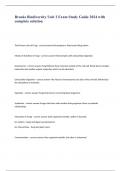
-
Brooks Biodiversity Unit 2 Exam Study Guide 2024 with complete solution
- Exam (elaborations) • 27 pages • 2024
- Available in package deal
-
- $12.49
- + learn more
The Primary role of Fungi - correct answer-Decomposers- they break things down Modes of Nutrition in Fungi - correct answer-Heterotrophs with extracellular digestion Exoenzymes - correct answer-Fungi Release these enzymes outside of the cell wall. Break down complex molecules into smaller organic molecules which can be absorbed. Extracellular Digestion - correct answer-The release of exoenzymes out side of the cell wall, followed by the absorption of nutrients.. Saprobes - correct an...
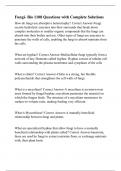
-
Fungi- Bio 1108 Questions with Complete Solutions
- Exam (elaborations) • 6 pages • 2024
-
- $16.49
- + learn more
How do fungi use absorptive heterotrophy? Correct Answer-Fungi secrete hydrolytic enzymes into their surrounds that break down complex molecules to smaller organic compounds that the fungi can absorb into their bodies and use. Other types of fungi use enzymes to penetrate the walls of cells, enabling the fungi to absorb nutrients from the cells. What are hyphae? Correct Answer-Multicellular fungi typically form a network of tiny filaments called hyphae. Hyphae consist of tubular cell walls su...
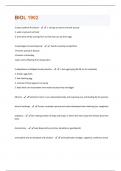
-
BIOL 1902 Questions + Answers Graded A+
- Exam (elaborations) • 27 pages • 2024
- Available in package deal
-
- $7.99
- + learn more
3 ways cowbirds find hosts - 1. sit high on perch and look around 2. walk on ground and look 3. drive birds off by scaring them so that they can lay their eggs 4 advantages of seed dispersal - -Avoids crowding competition -Prevents spread of disease -Prevents in-breeding -Saves some offspring from being eaten 5 adaptations of obligate brood parasites - 1. fast egg laying (20-40 sec for cowbirds) 2. thicker egg shells 3. fast hatching egg 4. removal of host egg prior to laying 5. baby ...

-
Bio 110 Exam 4 Questions With Complete Solutions.
- Exam (elaborations) • 42 pages • 2023
-
- $12.99
- + learn more
Although fungi generally lack extensive cellular specialization, what feature of hyphal growth makes them so well suited as decomposers, mutualistic symbionts, and pathogens? correct answer: a large surface area Fungi have unique life cycles. A fungus that has two parental nuclei in one cell is referred to as a ___________. correct answer: dikaryon dikaryon correct answer: hyphae with cells having 2 different nuclei in each cell. Chytrids are thought to be the ancestral group of fung...
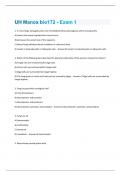
-
UH Manoa bio172 - Exam 1 Questions And Answers Rated A+ New Update Assured Satisfaction
- Exam (elaborations) • 10 pages • 2024
- Available in package deal
-
- $7.99
- + learn more
1. In most fungi, karyogamy does not immediately follow plasmogamy, which consequently A) means that sexual reproduction cannot occur. B) decreases the overall size of the organism. C) allows fungi withstand harsh conditions in a dormant state. D) results in heterokaryotic or dikaryotic cells. - Answer-D) results in heterokaryotic or dikaryotic cells. 2. Which of the following best describes the physical relationship of the partners involved in lichens? A) Fungal cells are enclosed within ...
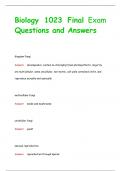
-
Biology 1023 Final Exam Questions and Answers
- Exam (elaborations) • 55 pages • 2024
- Available in package deal
-
- $13.79
- + learn more
Kingdom Fungi Answer> decomposers, contain no chlorophyll (non photosynthetic, majority are multicellular, some unicellular, non-motile, cell walls contained chitin, and reproduce sexually and asexually multicellular fungi Answer> molds and mushrooms unicellular fungi Answer> yeast asexual reproduction Answer> reproduction through spores sexual reproduction Answer> reproduction through mating of hyphae filaments Mycelium Answer> distinctive body; composed of micr...
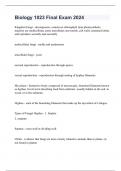
-
Biology 1023 Final Exam 2024
- Exam (elaborations) • 30 pages • 2024
-
Available in package deal
-
- $13.99
- + learn more
Kingdom Fungi - decomposers, contain no chlorophyll (non photosynthetic, majority are multicellular, some unicellular, non-motile, cell walls contained chitin, and reproduce sexually and asexually multicellular fungi - molds and mushrooms unicellular fungi - yeast asexual reproduction - reproduction through spores sexual reproduction - reproduction through mating of hyphae filaments Mycelium - distinctive body; composed of microscopic, branched filaments known as hyphae. Involved ...
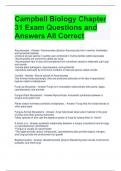
-
Campbell Biology Chapter 31 Exam Questions and Answers All Correct
- Exam (elaborations) • 7 pages • 2024
-
Available in package deal
-
- $13.39
- + learn more
Campbell Biology Chapter 31 Exam Questions and Answers All Correct Ascomycetes - Answer--Ascomycetes (phylum Ascomycota) live in marine, freshwater, and terrestrial habitats -produce sexual spores in saclike asci contained in fruiting bodies called ascocarps -Ascomycetes are commonly called sac fungi -Ascomycetes vary in size and complexity from unicellular yeasts to elaborate cup fungi and morels -include plant pathogens, decomposers, and symbionts -reproduce asexually by enormous numbers...

Do you wonder why so many students wear nice clothes, have money to spare and enjoy tons of free time? Well, they sell on Stuvia! Imagine your study notes being downloaded a dozen times for $15 each. Every. Single. Day. Discover all about earning on Stuvia


